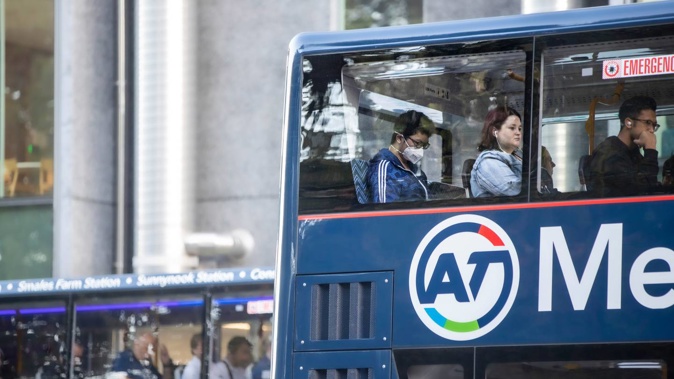
Most Aucklanders in a new poll support Mayoral candidate Efeso Collins' free public transport proposal for Tamaki Makaurau.
A survey of 772 Aucklanders conducted by Collins and research firm Talbot Mills showed 73 per cent support the proposal, while 7 per cent are opposed, 17 per cent neutral and 4 per cent unsure.
A new report by Dr Jen McArthur, commissioned by First Union and the Public Service Association, claims fare-free public transport will reduce social inequality and increase the general liveability of the city by lowering the cost of living and reducing congestion.
/cloudfront-ap-southeast-2.images.arcpublishing.com/nzme/XVYC5LIE6TCYNOQHPC2CCT4OR4.jpg)
Auckland Mayoral Candidate Faanana Efeso Collins. Photo / Supplied
Collins says "fare-free public transport is a quadruple win - good for easing cost of living pressures lowering emissions, tackling congestion, and revitalising our economy and town centres".
"We have a public health system, a public education system and I think we should treat public transport as no different," Collins says.
The report says going fare-free would transform public transport in Auckland into a right - something everyone should have access to regardless of social or economic status.
First Union, New Zealand's largest bus driver union, says fare-free public transport will also increase safety for drivers, as fares are a common factor in driver assaults.
The policy would help the city follow its climate plan to halve emissions by 2030 and to be net-zero by 2050.
According to that plan, the proportion of Tamaki Makaurau commuters using public transport must increase from 8 per cent currently to 25 per cent by 2030, and to 35 per cent by 2050.
The Government's decision to halve fares in April has already shown a 3.8 per cent increase in patronage (or 140,000 trips), with this set to rise further, as April is usually a slower month for public transport with school holidays, ANZAC and the Easter break.
However, research has found that while patronage does increase with fare reduction, most of the modal shift comes from pedestrians and cyclists, missing the mark on reducing car congestion and emissions.
Three years after fare-free public transport was implemented in Tallinn, Estonia (one of three cities McArthur's proposal was based on), public transport patronage increased by 8 per cent, but car journeys decreased by only 3 per cent, and pedestrian numbers also decreased by 5 per cent.
Heikki Liimatainen, professor of Transport and Logistics at the University of Tampere, says that the level of service (reliability, frequency, travel speed) and the quality of travel (comfort, convenience, etc.) are just as important as the price.
"The key question in fare-free public transport is whether public transport is seen as a form of social policy or a form of urban development policy."
"If the priority is to increase accessibility for all people, one solution is removing fares, but this doesn't necessarily reduce the number of cars," he says.
Liimatainen's research shows that people are more inclined to change to public transport based on quality of service and effort required, rather than the cost. These include the density of the network, waiting and walking time, speed of travel, and the frequency and reliability of trips.
"If the travel time (of public transport) is the same as a car, about half the people choose public transport. If it's 1.5 times longer by public transport, only about 1/4 of people choose public transport. When the travel time by public transport is twice as long, then basically only the people who need it will use it."
/cloudfront-ap-southeast-2.images.arcpublishing.com/nzme/JZ53ZXVVT3YGPHVXLRRK75JBQM.jpg)
Auckland Mayoral Candidate Viv Beck. Photo / Greg Bowker
In addition, Liimatainen says making public transport free could reduce car demand marginally, but potentially overburden the transport system.
Auckland Transport admits wages and working conditions for bus drivers are inadequate, with 1400, about ten per cent of bus trips being cancelled daily. This is not an exclusively post-Covid issue either, as staff shortages have been a problem for AT since before the pandemic.
Mayoral candidate Viv Beck says public transport in Tamaki Makaurau "works where it works", but is too unreliable and inaccessible in some areas, making her focus on improving existing public transport networks and services.
"It's really important that we have a service that is reliable enough and frequent enough to meet people's needs".
"I understand for some groups that cost is an important factor, and we are considering free fares for lower income people, older people and students," she says.
"But at the end of the day, we need a service that people want to get, that's good enough that people want to get out of cars."
Liimatainen agrees, saying "the main message we got from Tallinn was that simply removing the fares was not even to continuously increase patronage, although we saw a rise in the first months."
He says a 25 per cent shift by 2030 is "very unlikely".
"The only way that could happen is to not only get rid of fares, but dramatically increase the service quality, frequency of buses, and the density of the public transport network."
Efeso Collins said: "I want the city to be ambitious so everyone gets universal benefits from public transport. We have a public health system, a public education system and I think we should not treat public transport differently.
"If you look at the light rail system, 70,000 housing units are going to benefit from that… we've got to lift our eyes and understand there's a much wider picture here.
"If we don't set ambitious goals now, then we're always going to be tinkering on the edges. What's most important is increasing the patronage on public transport and then we build around that."
Take your Radio, Podcasts and Music with you









